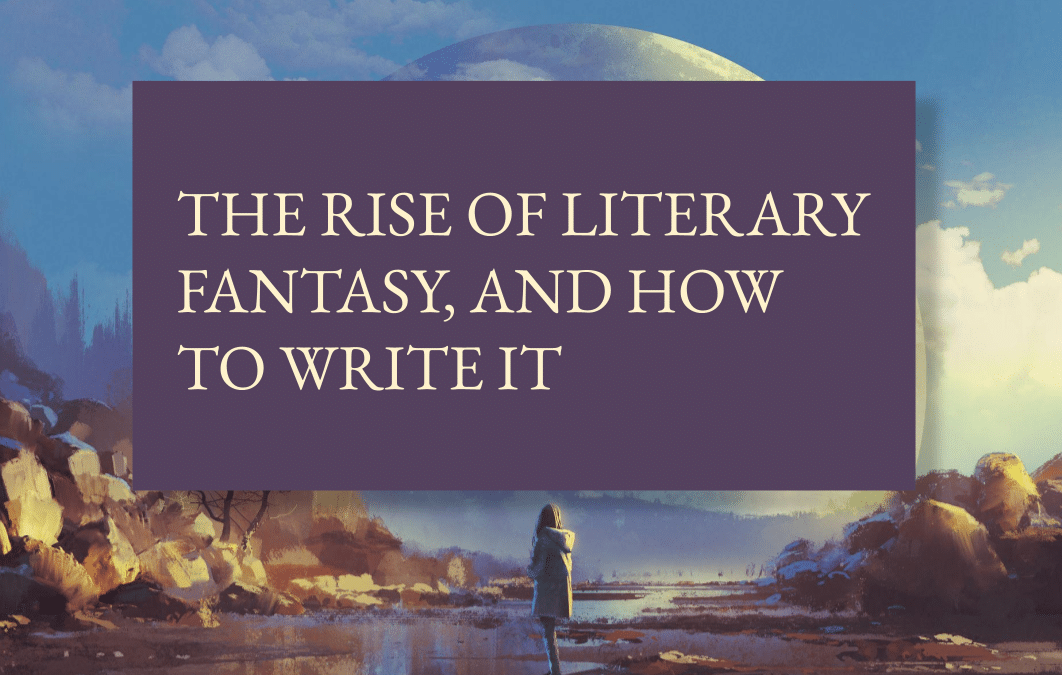There’s a new major player in the world of speculative fiction. You’ve probably seen it on the shelves of your favourite bookshop and on the shortlists for some prestigious prizes. ‘Literary fantasy’ really is the best of all worlds, bridging highbrow character studies with more traditional genre fiction.
Read on for a deep dive into this increasingly popular storytelling approach, with some tips on writing your very own literary fantasy work.
What even is ‘literary fantasy’?
Literary fantasy generally refers to work with strong magical elements that prioritises complex themes and nuanced characterisation. The fantastical worldbuilding often serves as a metaphor for real-world problems, and encourages the reader to think and reflect. These stories are told from a very human place, even if all the characters aren’t strictly human in the most limited sense.
Magical realism generally falls into this category, but literary fantasy can encompass other kinds of stories, too. The magical elements can be subtle or extraordinary, but they always have one thing in common: the magic is there to tell the story, and not the other way around.
Some of literary fantasy’s most notable authors include:
- Ursula K LeGuin
- Kelly Link
- Margaret Atwood
- Susannah Clarke
- K. Jemisin
- Adrienne Young
- E. Schwab
- Erin Morgenstern
Here’s something interesting: check out how many women are on that list! This isn’t to say that writers of other genders can’t write literary fantasy (Marlon James, Gene Wolfe, Charles de Lint); but, this no-man’s-land between literary and genre fiction seems to be a place where female storytellers flourish.
Elements of literary fantasy
While ‘literary’ is a term that’s often up for debate in the publishing world, there are a few key elements that you’ll generally see in literary fantasy books.
Characterisation
Truth bomb: traditional fantasy is about the archetype. Literary fiction is about the individual. Literary fantasy novels have complex, messy, authentic characters that feel like someone you could meet in real life. They have flaws, needs, fears, and beliefs that we recognise from within ourselves.
A dynamic arc
Once these characters are in place, they undergo what’s called a dynamic arc — an internal shift from one state of being to another. For example, a closed-off, bitter person learns how to love. Or a cowardly self-serving person learns how to be a hero. Regardless of what otherworldly forces may be raining down on the plot, the real story happens on the inside.
Theme
Closely related to the dynamic arc is theme: the core message of the story. Many literary fantasy novels will use speculative elements as a way to communicate something about their society, culture, or environment. The shift in understanding these characters go through will encourage the reader to examine these ideas in a new way.
Ambiguity
It’s not uncommon for fantasy novels to present good and evil as two clear binaries. Literary fiction, and literary fantasy, take a more nuanced approach. These novels raise ethical questions and leave room for interpretation (for this reason, they’re excellent choices for book clubs).
Beautiful prose
Finally, literary fiction luxuriates in itself at a line level. You’ll find extraordinary imagery and turns of phrase that turns the novel into a work of art. Because this genre isn’t quite as concerned with a rapidfire plot, it can take its time and draw the reader in.
Tips for writing your own literary fantasy novel
Ready to dive into your own literary fantasy work? Or maybe you just want to take your current work in progress and make it more ‘literary’ to appeal to a certain kind of reader. Here are some essential tips to consider as you go.
Deep dive your characterisation
Because literary fiction is rooted in character, getting to know your leading cast inside and out is essential. Work with character templates and brainstorming exercises to ensure you know your main character’s strengths, weaknesses, needs, fears, and desires. These are the things that are going to shape the plot.
Build your plot from your characters
Which leads us to… the story! In traditional fantasy, there can be a lot of external forces at play. Literary fantasy is more internal. The plot happens because of the choices your characters make, the repercussions of these choices, and the way they react to those repercussions.
It can help to make a line graph of every active choice your character makes throughout the plot. If your graph shows mostly passive reaction, you may need to find a way to encourage your character to push back a bit more.
Isolate your story’s theme
What are you trying to say with this story? That’s the core of literary fantasy. Consider how your conflicts could resonate with the wider world through the lens of symbolism and metaphor. This will draw your readers into the story and encourage them to reflect on its message.
Ask big questions
Literary fantasy is rarely black and white. Villains are misdirected, misinformed, misunderstood. Heroes are morally grey.
Allow space in your story for ambiguity and interpretation. Readers should be able to consider the choices your characters make and wonder what they would do in their circumstances. There’s more than one side to every story.
It may help to make a list of discussion questions for your readers. You’ll sometimes see these in book club guides at the back of certain novels, or as part of a press package. These questions will give you an idea of what to explore during your writing process.
Copy-edit like your life depends on it
Once you have a satisfying draft of your story in place, it’s time to polish it to a pristine shine. Have fun with the way you utilise language and imagery, and don’t shy away from some introspective interiority. The reader should be able to taste your words like fine wine.
Now go forth into the dark woods of storytelling. Happy writing!
Fija Callaghan is an author, poet, and unapologetic daydreamer. Her work has been shortlisted and longlisted for a number of short story prizes, and you can find her writing in publications like Gingerbread House, Crow & Cross Keys, Corvid Queen, and Mythic Magazine. When not writing or helping other writers get the best out of their work, she can be found haunting her local bookshops or watching the tide come in.
Do you write fantasy or science fiction?
Join our email list for regular writing tips, resources, and promotions.

